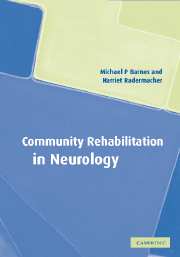Book contents
- Frontmatter
- Contents
- 1 Background to community neurological rehabilitation
- 2 Neurological rehabilitation – basic principles and models of delivery
- 3 Models of disability
- 4 Concepts of community
- 5 The views of disabled people
- 6 Outcome measures and research in the community
- 7 Evidence base for community neurological rehabilitation
- 8 Lessons from the south
- 9 Other aspects of community neurological rehabilitation
- 10 Community rehabilitation in childhood: concepts to inform practice
- 11 Neuropsychological rehabilitation in the community
- 12 The way forward
- Index
1 - Background to community neurological rehabilitation
Published online by Cambridge University Press: 11 August 2009
- Frontmatter
- Contents
- 1 Background to community neurological rehabilitation
- 2 Neurological rehabilitation – basic principles and models of delivery
- 3 Models of disability
- 4 Concepts of community
- 5 The views of disabled people
- 6 Outcome measures and research in the community
- 7 Evidence base for community neurological rehabilitation
- 8 Lessons from the south
- 9 Other aspects of community neurological rehabilitation
- 10 Community rehabilitation in childhood: concepts to inform practice
- 11 Neuropsychological rehabilitation in the community
- 12 The way forward
- Index
Summary
Why did we want to write this book? There are now many textbooks on rehabilitation, including an increasing number specifically about neurological rehabilitation. However, most of these texts are written from the standpoint of a traditional hospital-based medical speciality. Many, understandably, deal with diseases and symptom management with very little attention paid to the broader concepts of disability and community participation. Many disabled people either never enter hospital or spend only a small proportion of their lives within a hospital rehabilitation unit. Thus, it is ironic that modern rehabilitation practice, at least in the Western world, has a hospital focus. There is a clear need for coordinated rehabilitation to be provided in the home, or at least in the local community. This is a significant gap in health-service provision.
We are not aware of any major review of the literature on community rehabilitation and thus we thought it was an opportune moment to write this book. The expertise of the lead authors is in the field of neurological rehabilitation and so we have generally restricted our comments and critiques to this arena. Our primary aim is to review the need behind the provision of community rehabilitation and address the evidence for the efficacy of such community interventions. We hope this will not only stimulate clinical developments in this field but also encourage further research so that the evidence base may become more robust than at present. We hope that we have succeeded in these aims.
- Type
- Chapter
- Information
- Community Rehabilitation in Neurology , pp. 1 - 10Publisher: Cambridge University PressPrint publication year: 2003



